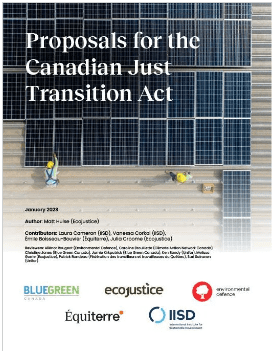For Immediate Release
February 1, 2021, Toronto — A new report from Blue Green Canada, Buy Clean: How Public Construction Dollars Can Create Jobs and Cut Pollution, says Canadian governments should shift their infrastructure spending to lower carbon options to support Canadian industries and workers.
When governments use their public infrastructure dollars to prioritize environmentally sustainable, low carbon construction materials, they’re participating in a growing movement called “Buy Clean”— and it’s a crucial component in our economic recovery.
“We need our governments to support the creation and retention of good jobs by strengthening Canadian industrial and manufacturing capacities in ways that support the low carbon transition of the economy, said Ken Neumann, Canadian National Director of the United Steelworkers. “Buy Clean makes sense for Canada because it leverages our carbon advantage. Whether its steel, aluminum, cement or wood, building materials sourced from within Canada are typically lower carbon than imported materials.”
Canada is already a leader in low carbon manufacturing. Canada’s energy and electricity systems are amongst the cleanest in the world with 82 per cent of our electricity now emissions-free. When you combine this with the efficiency of our manufacturers and the fact that it’s less polluting to ship materials across a land border than across an ocean, it becomes clear that Canada’s advantage is also its opportunity.
“America’s transformation to a cleaner economy represents a historic opportunity for Canada,” said Merran Smith, Executive Director of Clean Energy Canada. “We have plenty of clean power, a skilled work force, and the right natural resources – metals, steel, wood products, aluminum – for building the clean economy that America wants. If Canada wants its innovative companies to succeed down south, we need to buy what they’re selling here at home. With a shared border and plenty of advantages in Canada’s favour, this is our race to lose.”
Blue Green Canada’s report recommends governments in Canada take the following three actions:
- Continue to use and expand government procurement to support Buy Clean policies— so that public infrastructure dollars prioritize the use of lower carbon materials, fuels, and processes.
- Develop an Industrial Decarbonization Strategy—including for construction material manufacturing– to help demonstrate and commercialize technologies to further reduce the carbon footprint of Canadian manufacturers and help Canadian products become the lowest carbon in the world.
- Establish a Clean Infrastructure Challenge Fund— to encourage the use of low-carbon building materials in the construction of public infrastructure.
“Policies that direct public spending to lower carbon materials and fuels will in turn support industries, workers, and communities across Canada,” said Jamie Kirkpatrick, Program Manager with Blue Green Canada. “Our governments have an obligation to integrate climate change considerations into public spending.”
Blue Green Canada looks forward to supporting governments across the country to implement these achievable actions designed to capitalize on Canada’s domestic carbon advantage and support Canadian workers.
-30-
For more information, please contact:
Shannon Devine, Department Leader – Communications, Political Action, and Information Technology – United Steelworkers | PH: 416-544-5946|Cell: 416-894-7118| E: sdevine@usw.ca
Keri McNamara, Communications Specialist – Clean Energy Canada |PH: 778-951-8060|E: keri@cleanenergycanada.org
Jamie Kirkpatrick, Program Manager – Blue Green Canada |PH: 306-371-3406 | E: jkirkpatrick@bluegreencanada.ca


